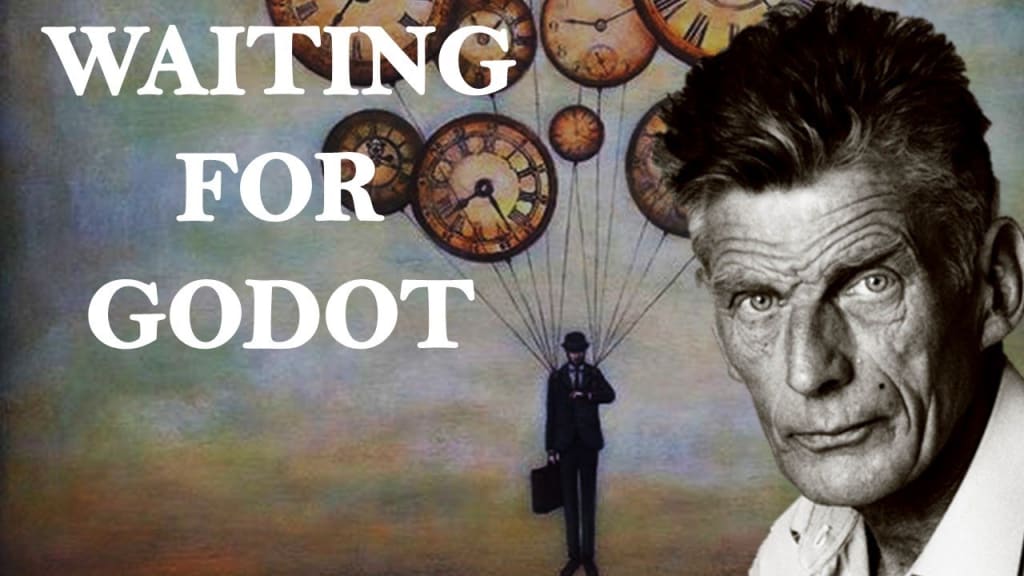It's All About Waiting, Or Is It?
You Decide

Whilst there are many books that I have read, that were very enjoyable read, there are very few that have made a very deep and long-lasting impression upon me. Waiting for Godot is one of a handful of books that have not only made an impression, but have also changed the way I view life and the world that we live in.
In a wonderful twist of irony, the simple act of me thinking and writing about the Samuel Beckett play, Waiting for Godot, and your reciprocal act of reading this review and processing what you read, are both perfect examples of one of the things that the play is about.
Imagine, for a moment, that you and I are actually enacting our very own version of one of the central themes of the play! If at this point you still have not got a clue what I am talking about, do not despair, you are not alone.
Upon its first performance, a great many people, just like you and I, didn't get it. In fact, it was only when the play was performed at a German prison that this theme of waiting was fully appreciated. The prisoners knew only too well what it meant to be waiting for the end of their sentence.
As it clearly states in the title, the play is about waiting. And what do we do when we find ourselves waiting for anything or anybody? We try to distract ourselves in a variety of ways by talking, writing, reading, playing games, anything to distract us from contemplating too much our predicament of having to wait.
Let me elevate this waiting game to a deeper significance for you. What if I told you that we spend our entire lives waiting for the end of our lives? The human condition is to have to live with the certain knowledge that one day we will die. And whilst many of us have high hopes that once we have passed away, we will move on to some sort of afterlife, in heaven, hopefully not in hell, we have no way of knowing for sure. And I think therein, is what the play is really all about, the uncertainty about just about everything.
Now this is where this play really hit me with a powerful force. Everything about the play is as uncertain as the many situations I found myself in a great many times throughout my life. I even wrote my own version of this theme in a song
Oh, my name it means nothing, my age it means less. And I come from Nowhere, somewhere way out west.
My mother and father, I don't even know, where did they come from, where did they go.
In Beckett's play, the only thing we know for sure are the names of the four main characters; Vladimir, Estragon, Lucky, and Pozzo. There are also two boys, but they don't have names. And of course, there is Godot (God?). Beyond that, nothing is certain.
The actual place where what little action there is happens could be just about anywhere. It is very sparsely described as 'A country road, near a tree.' That is it! Theatre Property Managers must have loved this play for the very few demands it made of them in setting the scene.
Likewise, the characters could be just about anybody, you, me, the guy sitting next to you at the metro station. Now at this point, I should point out that characters in the play do not actually exist. They are just words on a page. And yet, they do in a way exist in each and every one of us.
There has been a lot of speculation that Godot, who never makes an appearance, could be God. However, Beckett was very cagey about this. When questioned about Godot being God Becket replied 'No. It is just implied in the text, but it's not true.' " He is also on record as having said to the actor Ralph Richardson, "If I had meant God, I would have called him God."
At other times when questioned about the play, Beckett became agitated and said something along the lines of "If I knew what it was about I would have made that clear in the play." It seems that Beckett delighted in being evasive.
There is a great deal of banter between the characters throughout both of the asymmetrical acts, but there is next to no action. So a play of two acts where nothing happens, not once, but twice. Scenically and costume-wise, all is stripped down to the bare essentials. A tree in the dirt with too few leaves, characters dressed in rags, it really is life stripped bare of any of the accouterments of civilization. And yet it had the effect of gluing an audience to their seats for almost two hours!
It is noteworthy that a play can be so sparsely written and staged, and yet at the same time possess an abundance of riches in meaning. At this point, I could allude to the subjects of Historical Context, Scenic Design, Language, Tragedy, Comedy, Psychology, Philosophy, Christianity, Politics, Social Class, Sexuality, Ethics, Morality, and Autobiography. And yet, I do think that in doing this I would be missing the whole point of the play, which is to reflect upon the absurdity of all human life.
What's more, I am a firm believer and advocate of the pluralism of perception and meaning. And I do believe that Beckett was too. And one thing I think he strived for was to leave things uncertain, to allow you to make your own mind up about what it was all about. At the same time, Beckett certainly provided clues as to what you might think something was about, he gives the audience plenty of food for thought.
There is a dichotomy, or a sense of duality and ambiguity, of certainty and uncertainty, about many of the elements in the play. By way of example, Godot could be God, but Beckett could also at least have been inspired by a professional French cyclist called Godot. The story is that Beckett once heard cycle race spectators call out "Nous attendons Godot" - they were waiting for a competitor whose name was Godot. Yet another possibility is that the character could have been based upon a fictional character called Godeau from a novel by the French writer Balzac.
If I could sum up what Waiting for Godot is all about I can think of nothing more precise as a certain William Shakespeare once wrote in his play Macbeth.
"Life's but a walking shadow; a poor player, that struts and frets his hour upon the stage, and then is heard no more: it is a tale told by an idiot, full of sound and fury, signifying nothing."
All that is left for me to say is that you should read the play and, in part, make your own mind up on what Waiting for Godot is about. Then consult Wikipedia for more background information about Beckett and the play, and then re-appraise your initial thoughts to see if that changes anything. Who knows, you may even come up with an understanding nobody else has considered. Above all, enjoy what was once described as the "most significant English-language play of the 20th century"
About the Creator
Adam Evanson
I Am...whatever you make of me.
Enjoyed the story? Support the Creator.
Subscribe for free to receive all their stories in your feed. You could also pledge your support or give them a one-off tip, letting them know you appreciate their work.
Reader insights
Outstanding
Excellent work. Looking forward to reading more!
Top insights
Expert insights and opinions
Arguments were carefully researched and presented
Eye opening
Niche topic & fresh perspectives
Heartfelt and relatable
The story invoked strong personal emotions






Comments (1)
This was so fascinating! I loved your detailed explanations!